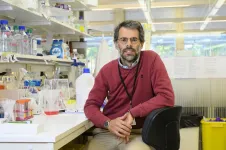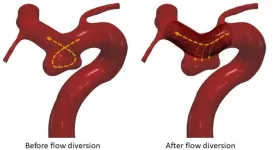(Press-News.org) BOSTON - Research has previously linked inflammation to Alzheimer's disease (AD), yet scientists from Massachusetts General Hospital (MGH) and the Harvard Aging Brain Study (HABS) have made a surprising discovery about that relationship. In a new study published in Alzheimer's & Dementia: The Journal of the Alzheimer's Association, they report that elevated levels of two chemical mediators of inflammation, known as cytokines, are associated with slower cognitive decline in aging adults.
"These are totally unexpected results," says the study's co-senior author, Rudolph Tanzi, PhD, vice chair of Neurology and co-director of the Henry and Allison McCance Center for Brain Health at MGH. These findings could eventually be used to help identify healthy people who are at risk for the devastating neurological condition, before they have symptoms.
In 2008, Tanzi led a team that discovered CD33, the first AD gene associated with the immune system (or the body's defense network that fights infection). Since then, most new AD genes identified have been linked to the immune system, and many studies support the theory that immune system dysfunction plays a part in AD. Notably, research has shown that people with AD and other forms of dementia have elevated levels of certain cytokines.
However, until now the role of the immune system in the earliest stage of AD--when brain changes characteristic of the disease silently progress in older adults without cognitive symptoms--was unclear. In the new study, Tanzi and his team collaborated with HABS investigators to find out if measuring cytokines in the blood (instead of in cerebrospinal fluid, which requires a lumbar puncture procedure, or spinal tap) could help predict which healthy people will later experience cognitive decline. Of particular interest were older people with normal cognition, but who had undergone imaging tests and were found to have deposits of amyloid beta--the major component of amyloid plaques, which are associated with AD--in their brains. "We wanted to know why some people have amyloid in their brain and don't seem to be affected, while other people experience cognitive decline," says study co-senior author Jasmeer Chhatwal, MD, PhD, a neurologist at MGH and a HABS co-investigator.
The partnership between the McCance Center and HABS, which is co-led by Reisa Sperling, MD, and Keith Johnson, MD, "was a natural fit," says Chhatwal, since both groups seek to understand the secrets of healthy aging and identify biomarkers of brain health. Moreover, HABS had rich data to examine. The new study included 298 men and women from HABS, who were between the ages 50 and 90. All had normal cognitive abilities when they volunteered and undergo retesting annually. Upon joining HABS, all participants had blood samples taken and underwent positron emission tomography (PET) brain-imaging scans; among other things, these scans looked for evidence of amyloid beta and other changes associated with AD, such as formations called tau tangles.
The study screened each participant's blood for nine cytokines to see if any were associated with the rate of cognitive decline and changes in the brain. The study found that people whose brains had a significant burden of amyloid beta, but who also had high levels of a pro-inflammatory cytokine called interleukin-12 (IL-12), experienced little cognitive decline. "However, men and women with elevated levels of amyloid declined more if they had a lower value of IL-12," says lead author Hyun-Sik Yang, MD, a neurologist at Brigham and Women's Hospital and a HABS co-investigator. High levels of IL-12 were also associated with fewer tau tangles. Meanwhile, elevated levels of another pro-inflammatory cytokine, interferon-gamma (IFN-γ), were associated with slower cognitive decline, whether or not a person had deposits of amyloid.
While it may seem counterintuitive that people who were protected against cognitive decline had the highest levels of inflammation-inducing proteins in the blood, that may be an indication that their immune systems were better "primed" to fight infection, says Tanzi. That would fit with a theory he developed with the late Robert Moir, PhD, a researcher at MGH and Harvard University, in which they hypothesized that amyloid beta forms in the brain as a defense against infection, ensnaring microbial pathogens in a sticky web. Unfortunately, the once-protective shield turns destructive over time, causing irreversible damage to neurons and synapses. However, having high levels of IL-12 and IFN-γ "may nip infections in the bud, before they can leak into the brain and induce Alzheimer's pathology," says Tanzi.
These results suggest that IL-12 and IFN-γ could one day be measured along with other biomarkers to predict future brain health in cognitively normal people--a tool that doesn't yet exist in medicine. "We don't have a 'checkup from the neck up'," says Tanzi. The next step toward that goal will be studying how IL-12 and IFN-γ may ward off cognitive decline and promote healthy brain aging.
Tanzi is the Vice-Chair of Neurology (Research) and Co-Director of the Henry and Allison McCance Center for Brain Health at MGH, and the Joseph P. and Rose F. Kennedy Professor of Neurology at Harvard Medical School (HMS). Chhatwal is an assistant professor of Neurology at HMS. Yang is an assistant professor of Neurology at HMS.
INFORMATION:
This study was supported by the National Institutes of Health, the Cure Alzheimer's Fund and the Doris Duke Charitable Foundation.
About the Massachusetts General Hospital
Massachusetts General Hospital, founded in 1811, is the original and largest teaching hospital of Harvard Medical School. The Mass General Research Institute conducts the largest hospital-based research program in the nation, with annual research operations of more than $1 billion and comprises more than 9,500 researchers working across more than 30 institutes, centers and departments. In August 2020, Mass General was named #6 in the U.S. News & World Report list of "America's Best Hospitals."
DALLAS, June 23, 2021 —Can starchy snacks harm heart health? New research published today in the Journal of the American Heart Association, an open access journal of the American Heart Association, found eating starchy snacks high in white potato or other starches after any meal was associated at least a 50% increased risk of mortality and a 44-57% increased risk of CVD-related death. Conversely, eating fruits, vegetables or dairy at specific meals is associated with a reduced risk of death from cardiovascular disease, cancer or any cause.
“People are increasingly ...
A fair society has evolved in banded mongooses because parents don't know which pups are their own, new research shows.
Mothers in banded mongoose groups all give birth on the same night, creating a "veil of ignorance" over parentage in their communal crèche of pups.
In the new study, led by the universities of Exeter and Roehampton, half of the pregnant mothers in wild mongoose groups were regularly given extra food, leading to increased inequality in the birth weight of pups.
But after giving birth, well-fed mothers gave extra care to the ...
Results of the MOSAiC expedition show: the expected recovery of the ozone layer may fail to happen anytime soon, if global warming is not slowed down
In spring 2020, the MOSAiC expedition documented an unparalleled loss of ozone in the Arctic stratosphere. As an evaluation of meteorological data and model-based simulations by the Alfred Wegener Institute, Helmholtz Centre for Polar and Marine Research (AWI) now indicates, ozone depletion in the Arctic polar vortex could intensify by the end of the century unless global greenhouse gases are rapidly and systematically reduced. In the future, this could also mean more UV radiation exposure in Europe, North America and Asia when parts ...
Researchers at Karolinska Institutet in Sweden have developed a technology for cost-effective surveillance of the global spread of new SARS-CoV-2 variants. The technique is presented in the scientific journal Nature Communications.
Since the onset of the pandemic, thousands of viral genomes have been sequenced to reconstruct the evolution and global spread of the coronavirus. This is important for the identification of particularly concerning variants that are more contagious, pathogenic, or resistant to the existing vaccines.
For global surveillance of the SARS-CoV-2 genome, it is crucial to sequence and analyse many samples in a cost-effective way. Therefore, researchers in the Bienko-Crosetto laboratory at Karolinska Institutet and Science for Life Laboratory (SciLifeLab) ...
The origins of seven types of kidney cancer, including several rare subtypes, have been identified by researchers at the Wellcome Sanger Institute, Great Ormond Street Hospital (GOSH), the Princess Máxima Center for Pediatric Oncology and Oncode Institute. The findings confirm that these cancers have their origin in specific forms of developmental cells present in the maturing fetus.
The study, published today (23 June) in Nature Communications, used computational methods to analyse existing datasets and pinpoint the 'cellular signals' given off by different cancers as they emerge. This method holds promise as a tool for diagnosing patients with rare cancers - in the study, one patient's cryptic kidney cancer was identified as ...
There is a race going on high in the atmosphere above the Arctic, and the ozone layer that protects Earth from damaging ultraviolet (UV) radiation will lose the race if greenhouse gas emissions aren't reduced quickly enough.
A new study from an international team of scientists, including University of Maryland Professor Ross Salawitch, shows that extremely low winter temperatures high in the atmosphere over the arctic are becoming more frequent and more extreme because of climate patterns associated with global warming. The study also shows that those extreme low temperatures are causing reactions among chemicals humans pumped into the air decades ago, leading to greater ozone losses.
The new findings call into question ...
With the National Eye Institute reporting that about 11 million older adults in the U.S. endure a condition that leads to progressive blindness, known as age-related macular degeneration, University of Maryland School of Medicine (UMSOM) researchers are starting to understand what goes wrong in the disease, in order to develop new therapies to treat it.
Using human tissue and mice in their new study, published on June 23 in
Nature Communications, they showed that the process which removes the eye's old, damaged light sensors is disrupted in macular degeneration.
Although more than 50 genes have been ...
Digital trial replicated and expanded upon results of traditional clinical trials
Developing virtual patient populations can speed up trials process
A study involving virtual rather than real patients was as effective as traditional clinical trials in evaluating a medical device used to treat brain aneurysms, according to new research.
The findings are proof of concept for what are called in-silico trials, where instead of recruiting people to a real-life clinical trial, researchers build digital simulations of patient groups, loosely akin to the way virtual populations are built in The Sims ...
Research led by scientists at the University of Bristol has shed new light on how the kidneys of the one-humped Arabian camel play an important role in helping it to cope with extremes.
In a new paper published today in the journal Communications Biology, they have studied the response of the camel's kidneys to dehydration and rapid rehydration stresses.
Camelus dromedarius is the most important livestock animal in the arid and semi-arid regions of North and East Africa, the Arabian Peninsula and Iran, and continues to provide basic needs to millions of people.
Thought to have been domesticated 3,000 to 6,000 years ago in the Arabian Peninsula, the camel has been used ...
SILVER SPRING, Md.-- Although Americans spend billions on them, published research shows a lack of strong evidence that dietary supplements and alternative therapies help adults lose weight, according to a new study published in Obesity, the flagship journal of The Obesity Society (TOS).
There are hundreds of weight-loss supplements like green tea extract, chitosan, guar gum and conjugated linoleic acid, and an estimated 34% of Americans who are trying to lose weight have used one.
For the study, researchers completed a comprehensive review of 315 existing clinical trials of weight loss supplements and therapies, and most of the studies showed the supplements did not produce weight loss among users.
"Our findings are important ...



